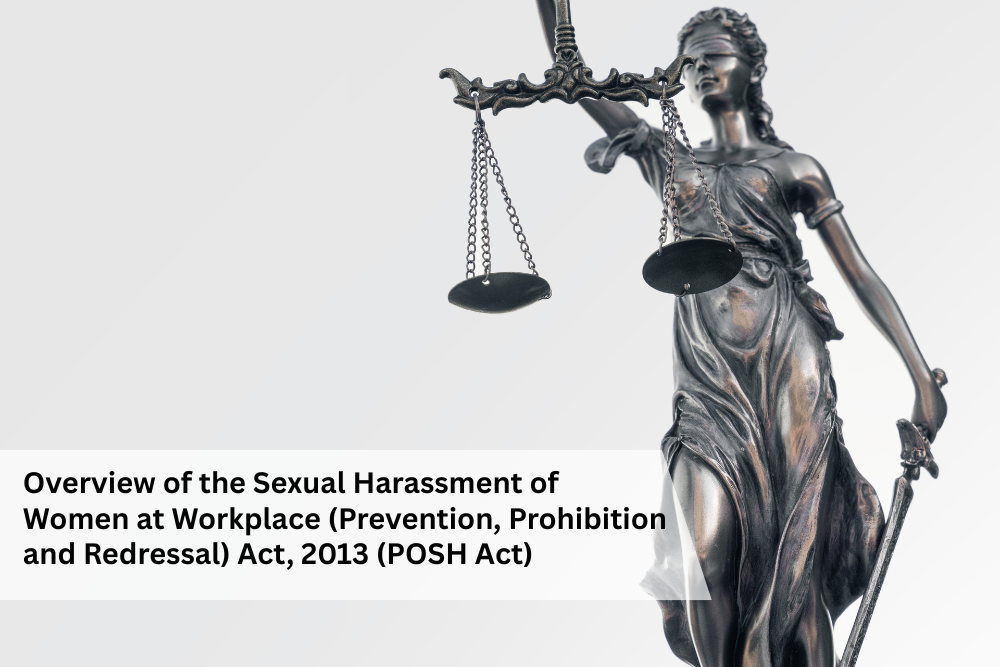
The Indian government enacted the Protection of Women from Sexual Harassment Act, 2013 to ensure the safety and well-being of women in the Workplace, specifically addressing issues of sexual harassment and abuse. This Act was enforced specifically to ensure workplaces are devoid of sexual harassment and thus ensuring that a safe and secure environment is available for women.
The POSH Act was instituted by the Government of India in 2013 with the aim of addressing sexual harassment of women in the Workplace. This legislation seeks to establish a secure and encouraging work environment for women while also safeguarding against sexual harassment. The objective is to increase awareness regarding sexual harassment and guarantee that individuals who have experienced it can access the necessary legal remedies. The POSH Act 2013 also includes provisions for establishing Internal Complaints Committees (ICCs) in organizations to address sexual harassment complaints and promote a safe working environment for women employees.
The POSH Act signifies remarkable progress in ensuring that women in India have access to a safe and respectable working environment.
Reason for creation of POSH act-
Bhanwari Devi, a social worker for the Rajasthan government's Women's Development Project, was viciously assaulted by five men in 1992 when she attempted to prevent her one-year-old daughter's marriage. Activist groups raised concerns about the lack of explicit legislation addressing gender equality and sexual harassment in the workplace throughout the legal proceedings, and the Supreme Court emphasized this point. In 1997, the Court accepted the Vishakha Guidelines to keep things going until more official legislation was implemented. All workplaces were expected to follow these laws, which carried strict legal weight. Article 15, among other provisions of the Constitution, outlaws discrimination based on religion, race, caste, gender, and place of birth; the Court's authority stems from this clause. The study addressed the Indian ratification of the 1993 Convention on the Elimination of All Forms of
Discrimination Against Women (CEDAW), its General Recommendations, and other major international accords and standards1.
The Supreme Court's recent critique of the Act emphasizes the need for vigorous enforcement. None of this is new, as this issue has been mentioned in the past when the Court had to intervene and provide practical guidance for several occasions since the Vishakha guidelines of 1997 and the National Commission for Women's revised Code of Workplace Conduct, 2000, 2003, 2004, 2006, 2010. A bill to protect women from sexual harassment in the workforce was sponsored by Krishna Tirath (Minister for Women and Child Development) in 2007, which made its way to Parliament and was amended, and the new law (the Sexual Harassment of Women at Workplace (Prevention, Prohibition and Redressal) Act) became effective on December 9, 2013.
Under the PoSh Act, what are the definitions of an employee, the Workplace, and sexual harassment?
The PoSH Act defines what is sexual harassment, including behavior such as physical contact, sexual advances, solicitation of sexual favors, sexually suggestive comments, showing pornography, and any other form of unwanted sexual behavior.2
It also defines five situations which may amount to sexual harassment –
The Act defines five situations that may constitute sexual harassment:
• An implied or express promise of favourable treatment in employment;
• An implied or specific threat of unfavourable treatment in employment;
• A threat, either implied or express, of occupational status within the organization currently or future;
• Interfering with one's employment, making the work environment intimidating, hostile or offensive, and
• Humiliating treatment is likely to have the effect on her health or safety.
1 Rajkumar, M. (2022) The History Behind Sexual Harassment at the Workplace Law, nyaaya.org. Available at: https://nyaaya.org/guest-blog/the-history-behind-sexual-harassment-at-the-workplace-law/ (Accessed: 08 July 2025).
2 Understanding workplace under PoSH Act (2023) ungender.in. Available at: https://www.ungender.in/workplace-under-posh-act/ (Accessed: 08 July 2025).
Under the Act, an employee is not only termed based on company policies. Any female employee, whether employed or not, is entitled to report any form of sexual harassment in the Workplace.
The meaning of 'workplace' has been extended to cover several forms of organizations across industries, such as non-traditional workplaces such as telecommuting and places visited by employees for work-related reasons. This provision is applicable to every public and private sector organization in India.
What are the regulations that businesses must adhere to?
Employers with over ten staff should set up an Internal Complaints Committee (ICC) that can be approached by female staff to formally report a sexual harassment case3. The leadership must be female, with two female staff and one other staff member. To prevent interference by superiors, try using the services of a third party, such as an NGO official who has five years of experience and is familiar with sexual harassment cases. In addition to this, the Act requires that every district throughout the country have a local committee (LC) to resolve complaints of women who work in small enterprises with less than ten workers and in the informal economy to include women who are home workers, home-based workers, voluntary government social workers-workers and so on.
Both organizations have to investigate under the Act creating issues for both also under POSH Act and in accordance with the provisions of natural justice provided for in the Rules of the Act. A woman should lodge a written complaint with either the internal complaints committee or the local complaints committee within three to six months of the act of sexual harassment.
There are two ways in which the committee resolves the issue:
· Through a settlement reached between the respondent and the complainant (other than monetary settlements)
· Through initiating an investigation and taking the required steps accordingly.
A year-end annual audit report must be submitted by the employer to the district officer with the complaints of sexual harassment made and the action taken thereupon. The employer has to arrange periodical workshops and sensitization programs to provide information to
3 Kulshrestha, S. (2022) All about internal complaint committee, blog.ipleaders.in. Available at: https://blog.ipleaders.in/all-about-the-internal-complaints-committee-icc/ (Accessed: 08 July 2025).
employees on the Act and arrange orientation and programs for members of ICC. In case of a failure to constitute an Internal Complaints Committee or adherence to any other provision, the punishment will be up to a fine of ₹50,000 or more for subsequent offenses4.
What are the barriers in implementing the Act?
In a recent ruling, the Supreme Court highlighted the gaps in the Constitution of ICCs, and referred to a news report which stated that 16 out of the 30 national sports federations do not have an ICC in place. The report was brought out at the time of the wrestler's protest in Delhi against the president of the Wrestling Federation of India (WFI) for alleged sexual harassment incidents. The ruling pointed out problems with the structure of ICCs, citing inadequate members or absent necessary external members. Nonetheless, there are also implementation issues under the PoSH Act. Experts in the field, stakeholders, and erstwhile members of such committees have raised several issues with the law and its implementation since it was passed.
One such question is why the Act has not done enough to address accountability since it must determine the role players who are to enforce compliance in workplaces or who are to be held accountable for non-compliance. Human rights activist and advocate Vrinda Grover feels that State governments should do more. The government told Parliament in 2019 that it does not maintain centralized data on women's workplace harassment complaints.
Stakeholders noted barriers accessing the legal systems for women workers in the informal sector, with a reported number of women workers in India found to be over 80% in the informal sector. Furthermore, experts acknowledge that sexual harassment in the workplace is underreported in India for a number of reasons. The authors of the law realized that addressing complaints in civil institutions (workplaces) might be a less time-consuming mode of empowering women, avoiding the necessity of dealing with the cumbersome criminal justice system and its problems of access and promptness. However, the poor functioning and lack of clarity in the rules on how to conduct such inquiries, along with a lack of female employee awareness about these committees and who to approach in case of harassment, have added to the barriers only in reaching the justice system. One of the major deterrents for women to lodge
4 Organisations without internal complaints committee to face ₹50,000 fine (2025) thehindu.com. Available at: https://www.thehindu.com/news/cities/Coimbatore/organisations-without-internal-complaints-committee-to-face-50000-fine/article69294232.ece#:~:text=Organisations%20without%20internal%20complaints%20committee%20to%20face%
20%E2%82%B950%2C000%20fine,-Published%20%2D%20March%2005&text=The%20Sexual%20Harassment%20of%20Women,provisions%
20of%20the%202013%20Act. (Accessed: 08 July 2025).
complaints is the power relations within organizations and the fear of being subjected to professional reprisals.
In sexual harassment claims, concrete evidence can prove elusive, but it does not necessarily equate to a lack of crime having been committed. Nonetheless, in a number of legal actions, the courts have been unwilling to deal with this internal tension and have instead minimized the burden of evidence. Women have been punished and fired. According to the regulations, ICCs/LCs investigations must operate by the principle of "natural justice" just as the judiciary do. Nevertheless, stakeholders and the Saksham Committee report (2010) has emphasized having a distinctive due process for ICs, owing to the particular nature of sexual harassment as gender discrimination disproportionately affecting women in patriarchal systems.
-------
Submitted by:
Nivethi Natarajan





